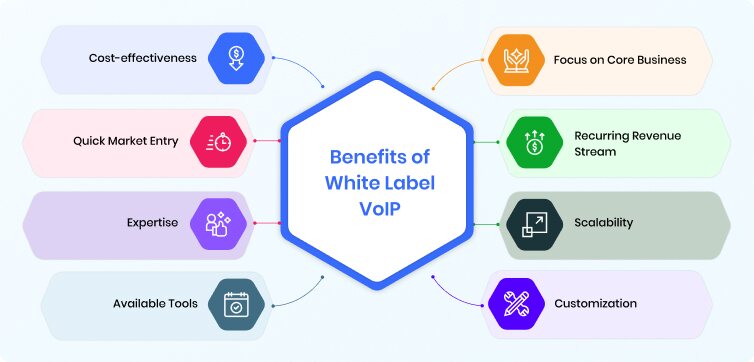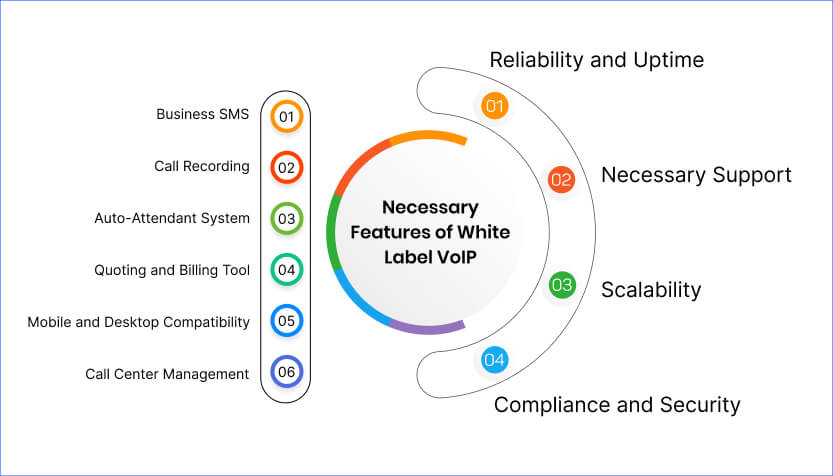
If you work in a telco or an IT industry, the term VoIP must be familiar to you already. Voice Over Internet Protocol or VoIP in short is a communication technology used for voice or video communication over an IP (Internet Protocol) network, such as the Internet. But today, we’re not talking about what VoIP is, rather we’ll explore something much more interesting— ‘White Label VoIP’. We’ll also try to make a list of the top White Label VoIP providers in the market in terms of features, service & customer support, pricing, and reliability.
White Label VoIP empowers businesses to offer personalized voice and video over IP services under their own brand. This technology leverages the infrastructure and platform of a third-party provider while incorporating the company’s unique branding and customizations. The emergence of White Label VoIP providers is revolutionizing business telecommunications by enabling companies to deliver branded VoIP services without substantial investments in infrastructure.
According to Global Market Insights, Inc., the VoIP (Voice Over Internet Protocol) market is going to hit $55 billion by 2025. So, it’s high time for any VoIP reseller to find out the top White Label VoIP providers in the market. This comprehensive guide will let you do that in a five-minute read. Let’s begin, would we?
What is a White Label VoIP?
White Label VoIP is a service where one company provides VoIP services or infrastructure that can be rebranded and sold by another company as their own product. This means that businesses, especially those without their own network and resources, can offer VoIP services to their customers under their own brand name without needing to develop their own VoIP technology.
It’s like buying a ready-made VoIP solution and putting your label on it. That’s where the term ‘White Label VoIP’ comes from. Also called Private Label VoIP, it enables businesses to offer a complete range of VoIP phone services to their customers under their own brand name. These services partner with resellers to quickly and smoothly integrate their solutions among end-users.
White Label VoIP allows companies to provide advanced communication services without the need to invest heavily in the infrastructure and technical know-how required to create their own VoIP platform.
How Does White Label VoIP Work?

So, how does White Label VoIP work to facilitate your business? Instead of using traditional phone lines, VoIP technology changes analog voice signals into real-time digital data packets for incoming and outgoing voice or video calls. These packets travel over your customer’s internet protocol (IP) network, eliminating the need for complex infrastructure because the entire system is managed from the cloud.
Storing telecom data on the cloud allows VoIP-enabled businesses to keep their workforce connected through a simple dashboard accessible from any digital device and location.
Although VoIP uses different technology from legacy business phones, there’s no loss of connectivity because VoIP calls to legacy phones are converted back to analog signals when necessary. The white-label aspect allows you to use your brand reputation while fully owning the customer relationship.
Benefits of Reselling White Label VoIP

By 2025, the North American VoIP market is expected to lead with a share of over 40% in the industry. This growth is propelled by extensive adoption of cloud services, well-established telecommunications infrastructure, and increasing preference for workforce mobility. Source
Statistics clearly show that VoIP businesses are going to flourish within the next few years. This is the perfect time to start your white-label hosted VoIP business if you haven’t done it yet. No need to worry about infrastructural investment or expert manpower as there are lots of opportunities to get it from a White Label VoIP provider. You can rebrand the service and provide VoIP services to your customers.
Here are some of the benefits you get when using a White Label VoIP from a trusted provider:
1. Cost-effectiveness
White Label VoIP eliminates the need for businesses to invest in costly hardware and software infrastructure. By leveraging the services of a white-label provider, businesses can avoid upfront development costs and ongoing maintenance expenses. This cost-saving aspect allows companies to allocate resources more efficiently, directing funds toward other strategic initiatives such as marketing, product development, or customer acquisition.
2. Quick Market Entry
Quick market entry is a key benefit of White Label VoIP service, enabling businesses to swiftly launch VoIP services without the typical delays associated with developing new technology. By reselling customizable and pre-established telecommunication solutions, companies can capitalize on existing infrastructures, reducing time-to-market significantly.
This expedited entry provides a competitive edge, allowing businesses to promptly meet market demands, engage customers, and establish a presence in the rapidly evolving cloud communications landscape.
3. Expertise
White Label VoIP providers bring extensive industry knowledge and technical expertise to the table. By partnering with these providers, businesses can tap into their experience and leverage advanced technology and infrastructure for delivering high-quality voice and video services. This expertise ensures that businesses can offer reliable and innovative communication solutions to their customers, ultimately enhancing satisfaction and retention rates.
4. Available Tools
Private Label VoIP services typically come with a range of built-in tools and features essential for managing voice and video communications effectively. These tools may include call routing, call recording, call analytics, voicemail-to-email, conference calling, and more. By utilizing these features, businesses can streamline their communication processes, improve operational efficiency, and deliver a seamless experience to their users.
5. Focus on Core Business
With pre-packaged and customizable white-label solutions, companies can redirect resources and efforts toward enhancing their primary operations. This streamlined approach not only increases operational efficiency but also ensures that businesses can excel in their core areas, leaving the intricacies of telecommunication technology to the expertise of white-label providers.
6. Recurring Revenue Stream
Offering white-label phone systems creates a steady stream of recurring revenue for businesses. By charging monthly service fees to customers, businesses can establish a predictable income stream that contributes to long-term financial stability and growth.
This recurring revenue model provides businesses with a reliable source of income that can be reinvested into the business to fuel expansion, innovation, and further development of products and services.
7. Scalability
White Label VoIP solutions are highly scalable, allowing businesses to adjust their services to meet changing demands and accommodate growth. Whether a business needs to add new users, expand features, or support a larger customer base, White Label VoIP providers can easily scale their offerings to align with evolving business needs. This scalability ensures that businesses can adapt to market dynamics and seize new opportunities without being constrained by technical limitations or infrastructure constraints.
8. Customization
This is a key feature empowering businesses to tailor VoIP solutions to their specific needs. Customization allows companies to align communication services with their brand identity and incorporate unique features for both internal and external communication.
Providing a customized experience allows businesses to stand out in the market, elevate customer satisfaction, and effectively cater to specific niche demands. The ability to customize ensures that the White Label VoIP solution seamlessly integrates with the business model, providing a unique and tailored communication experience for both resellers and end-users.
Features to Look for in a White Label VoIP Phone System

What features should you look for before taking a White Label VoIP service? A valid question indeed. Let’s find out what features are important for White Label VoIP resellers—
- Business SMS: Incorporating SMS messaging into your business communication system enables seamless communication consolidation, ensuring all interactions are centralized within one platform.
- Call Recording: The capability to record calls serves both training and quality assurance objectives. Additionally, it offers a means to retain crucial call records for future reference.
- Auto-Attendant System: A virtual receptionist, automated for efficiency, warmly welcomes callers and directs them to the relevant extension or department, enhancing customer service and operational efficiency.
- Quoting and Billing Tool: This utility prepares quotes and invoices for clients and monitors billing data. This functionality streamlines billing procedures and enhances accuracy.
- Mobile and Desktop Compatibility: A software-driven phone accessible on computers and mobile devices enables employees to handle calls from any location. This feature, offered by White Label VoIP providers, provides flexibility and mobility for employees working remotely.
- Call Center Management: Tools for call center management, encompassing call routing, monitoring, and performance reporting, are indispensable for businesses with call center operations.
Apart from these technical features, there are other factors you should check when choosing a White Label VoIP Provider. The following characteristics of a white-label provider will ensure your business profitability and give you a remarkable experience in building long-term relationships with your service provider and customers—
- Reliability and Uptime: When selecting a White Label VoIP provider, reliability and uptime are crucial factors to consider. These ensure consistent service and minimize downtime. A provider with high uptime offers businesses a stable communication platform, promoting seamless operations and dependable connectivity for both resellers and end-users.
- Necessary Support: Customer support and service also play a vital role. A provider with omnichannel customer support ensures timely assistance and effective issue resolution, fostering a reliable communication environment. Strong support mechanisms enhance the overall user experience, providing businesses with the confidence and assistance needed for seamless operations.
- Scalability: Scalability enables businesses to adjust communication services as they expand. Providers offering scalable solutions facilitate seamless growth, ensuring the VoIP system can effortlessly accommodate a growing user base or changing needs without sacrificing performance, efficiency, or user experience.
- Compliance and Security: In selecting a White Label VoIP provider, compliance and security are of utmost importance. It’s essential to verify adherence to industry regulations and robust security measures to safeguard sensitive communication data.
Top 6 White Label VoIP Providers in the Market
Although it’s difficult to say who is the best among White Label VoIP providers, I’ve prepared a list of 6 players in the market who are doing great in terms of innovative features, pricing, device compatibility, support, etc. Understanding and comparing each of the points will help you decide which white-label service is a perfect fit for your business.
1. REVE Systems
REVE is a Telecommunication & Software Solution provider, trusted by hundreds of small and medium businesses as well as large telco brands. The company today holds a leadership position in White Label VoIP solutions along with other carrier-grade telecommunication services.
What makes REVE white-label services stand out in the market is their customer-oriented approach regarding software development, customer support, and pricing. They provide customized VoIP services you can rebrand as your own and make a stable and recurring revenue in your business.
Notable Features
- Fully customizable solution
- Voice and video calling
- Own Logo, name, features, interface, etc
- Dedicated support when needed
- Wide range of OS and device support
- Ready-to-offer mobile app
- Exclusive feature set for call centers
Pros & Cons
| Pros | Cons |
| 1. Excellent voice & video calling | 1. Pricing information not available |
| 2. Easy and organized business management | 2. Overwhelming product category on website |
| 3. 24*7 customer support | |
| 4. Cost-effective VoIP solution |
Pricing
Pricing depends on specific needs and business scale
2. WhiteLabel Communications
WhiteLabel Communications presents an extensive White Label VoIP solution tailored for businesses of all sizes. It enables them to offer their own fully-branded, reliable, and feature-rich communication services to customers. Through cutting-edge VoIP technologies, businesses can ensure a seamless communication experience that resonates with their brand identity and values.
What sets WhiteLabel Communications apart is its comprehensive white-label partner program, which includes customizable branding options and a Unified Communications as a Service (UCaaS) approach.
Notable Features
- Voice & video calls
- Mobile application
- Device as a Service (DaaS)
- Call forwarding and call routing
- IVR and auto-attendant
- Voicemail
- Dedicated call center features
Pros & Cons
| Pros | Cons |
| 1. Highly customizable VoIP solution | 1. Can be difficult to use for new users |
| 2. Great customer support and necessary assistance | 2. Expensive for smaller businesses |
| 3. Wide range of features and tools | 3. Limited information on website |
| 4. Integration with popular business software |
Pricing
No flat pricing. Their pricing is based on services and scale
3. RingLogix
RingLogix stands out as a supremely flexible and customizable White Label VoIP phone system, enabling partner companies to provide their customers with fully branded and feature-rich communication services. Leveraging RingLogix, businesses gain access to an array of potent communication tools encompassing voice, messaging, video conferencing, and beyond, ensuring a seamless and intuitive communication experience for all users.
Notable Features
- Both voice and video calls
- SMS and fax messaging
- Call forwarding and call routing
- IVR
- Voicemail & call recording
- Web conferencing and screen sharing
- Contact center and call center features
Pros & Cons
| Pros | Cons |
| 1. All favorable VoIP feature set | 1. No pricing information mentioned |
| 2. Flexibility & customization | 2. No information on OS support |
| 3. Integration with all popular business software | 3. Make sure they provide necessary after-sales support |
| 4. Own branding option |
Pricing
The pricing details for RingLogix’s white-label service are not explicitly outlined; instead, they seem to be determined on an individual basis, depending on specific custom requests.
4. Omnivoice
Omnivoice stands as a versatile White Label VoIP provider, supporting multiple platforms and offering advanced call management features. With a customizable Interactive Voice Response (IVR) system, it caters to diverse communication needs while maintaining user-friendliness for administrators and end-users.
Omnivoice balances a rich feature set with ease of use, making it suitable for businesses of varying sizes. Moreover, businesses partnering with Omnivoice can create their own branded communication platform, ensuring safety, privacy, and full customization while enjoying top-desired features.
Notable Features
- Multi-platform support
- High-quality voice and video calls
- IM and voicemail
- Virtual numbers
- Customizable IVR and voicemail
- Multi-language support
Pros & Cons
| Pros | Cons |
| 1. Customizable branding | 1. Limited third-party integrations |
| 2. Advanced call management features | 2. May not be appropriate for very large enterprises |
| 3. High-quality calls | 3. May seem difficult for non-technical users |
| 4. Quick response support team |
Pricing
Custom pricing, depending on the individual services provided.
5. DialerHQ
DialerHQ focuses on delivering seamless communication solutions tailored for businesses. Specializing in white-label phone services, with a strong focus on call centers, it boasts an intuitive interface and robust analytics capabilities. Its efficient call recording and monitoring features contribute to an enhanced user experience, rendering it an invaluable choice for businesses in search of optimal communication tools.
Notable Features
- Predictive dialer
- Call recording & call monitoring
- Voice & video
- Real-time analytics
Pros & Cons
| Pros | Cons |
| 1. Predictive dialer helps call centers with bulk dialing needs | 1. Might not be suitable for small teams |
| 2. Tacking & recording features | 2. Setup can be time-consuming |
| 3. Dedicated and quick support when needed | |
| 4. Analytics tools |
Pricing
Based on needs and preferences.
6. CallHippo
CallHippo, a prominent VoIP provider, offers white-label phone services renowned for their customizable UI, advanced analytics, and seamless CRM integration. Its intuitive interface, scalability, and robust integration capabilities make it the top choice for businesses seeking streamlined and tailored communication solutions.
Notable Features
- Customized UI
- Call analytics and reporting
- CRM integration
Pros & Cons
| Pros | Cons |
| 1. User-friendly interface | 1. Limited customization in low-tier plans |
| 2. Supports a wide range of devices and OS | 2. Can be expensive for small businesses |
| 3. Scalable to any business | |
| 4. Seamless integration and CRM system |
Pricing
The basic package starts at $16 per user per month and it can be as expensive as $40.
How to Choose the Best White Label VoIP Provider for Your Business?

Choosing the appropriate White Label VoIP provider for your business might be difficult sometimes. However, if you know what features your business needs and what points you must check before selecting a provider, it becomes easy. Simply ask the VoIP provider the 5 questions below to ensure that you are taking the right white-label service.
1. Is the UI or control panel user-friendly?
Seek a white-label provider providing a modern control panel that’s effortless to navigate and oversee. Ensure its design is contemporary, boasting a sleek and user-friendly interface.
2. Can you integrate it with other business operations?
Ensure your provider can seamlessly integrate with your current business processes, tools, and systems. This integration enhances operational efficiency and effectiveness in running your business.
3. Is the network architecture and status communication suitable for you?
A reliable provider must possess a sturdy network architecture capable of delivering top-notch voice and video services to your customers. Additionally, it should furnish real-time status updates and alerts regarding its network performance.
4. What are the features and how expensive is it?
Evaluate the features provided by the provider, including call routing, voicemail, call conferencing, and others. Ensure you have access to the necessary features to efficiently operate your business. Seek a provider offering competitive pricing with a transparent fee structure.
5. Do they provide the necessary support when needed?
Select a provider that provides attentive and supportive assistance through various channels like phone, email, and live chat. This ensures timely help whenever necessary, maintaining the smooth operation of your business.
Conclusion
Selecting the right one from all the White Label VoIP providers in the market is crucial for businesses aiming to enhance their communication infrastructure. But now you can be confident enough to talk to a VoIP provider, ask them the necessary questions, and select the suitable one for your business.
From robust control panels to seamless integration and reliable network architecture, each aspect plays a vital role in ensuring a smooth and efficient communication experience. By carefully evaluating providers based on their features, pricing, and support options, businesses can make informed decisions that align with their specific needs and goals. With the right White Label VoIP partner, businesses can not only streamline their communication processes but also elevate their brand presence and customer experience.




























